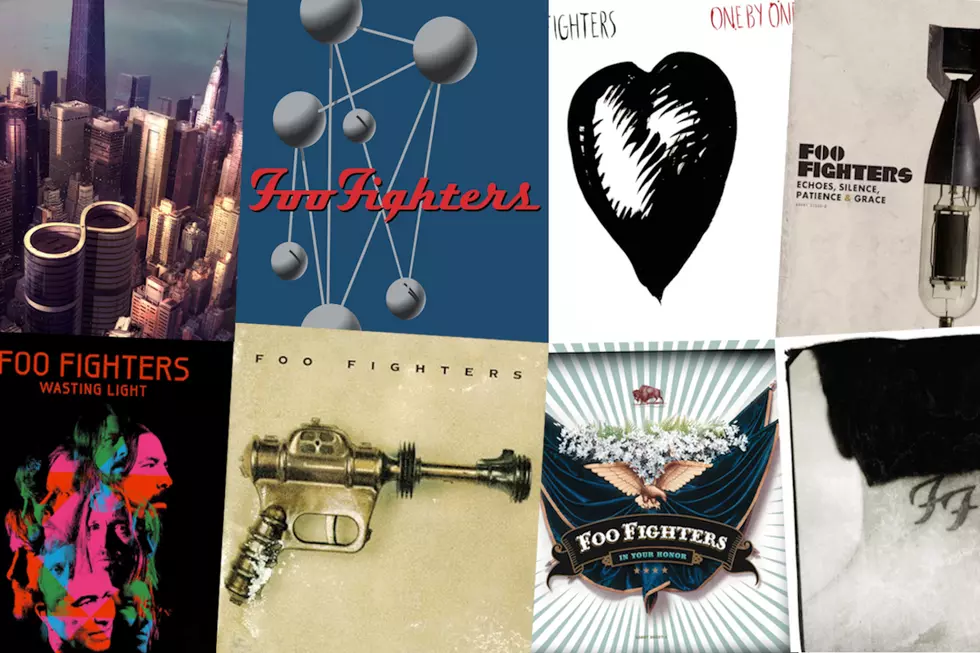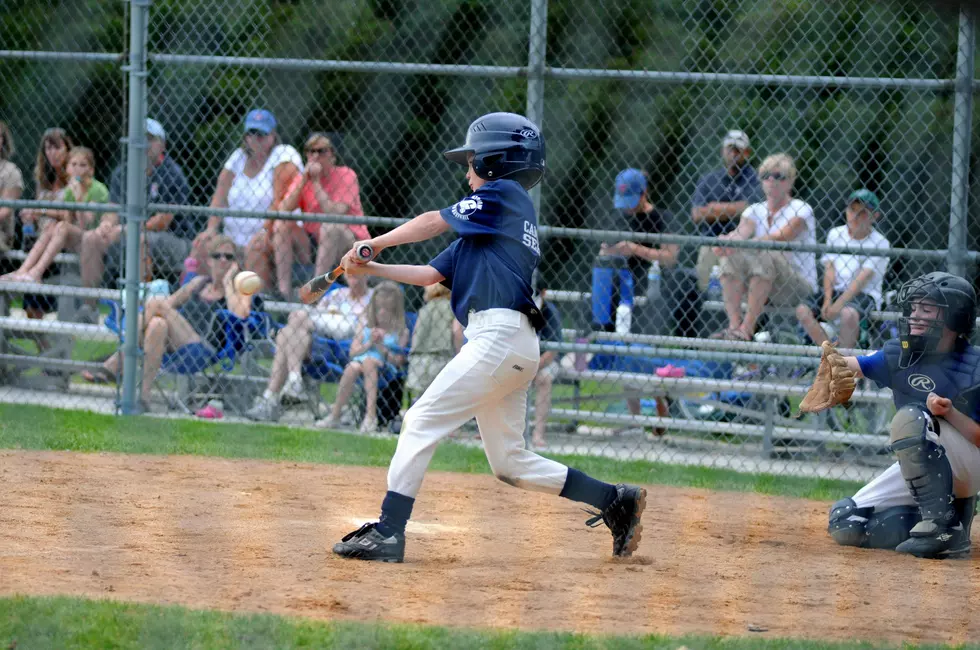
Underrated Foo Fighters: The Most Overlooked Song From Each Album
Foo Fighters are the preeminent rock band of the 21st century. Still, many rock purists seem to turn their nose at the group’s success.
Despite a slew of platinum albums, radio hits and a reputation as one of the best live acts around, there are some people who remain unconvinced of the band’s merit. While much of the music-loving public celebrated Foo Fighters' inclusion in the 2021 Rock & Roll Hall of Fame class, there was still a vocal minority who questioned whether the group was really deserving.
Music will always be a matter of taste, but it’s also possible that these pundits are familiar with only the Foos' chart-topping hits. A deeper dig into the band’s discography shows just how varied its catalog really is.
We stripped away the band's most popular tracks - like “Everlong,” “Learn to Fly,” “All My Life, “Best of You” and “The Pretender” - and disqualified any song released as a single. That still left us with a fantastic collection of cuts from which to choose the Most Overlooked Song From Each Foo Fighters Album.
"Alone + Easy Target"
From: Foo Fighters (1995)
Dave Grohl played a demo of this song to Kurt Cobain back in their Nirvana days, and the frontman was reportedly so enamored with the track that he wanted to include it on one of the band’s albums. Instead, “Alone + Easy Target” made it onto Foo Fighters’ self-titled debut. Still, the echoes of Grohl’s previous band are certainly evident, with the type of fuzzed-out riffs and instantly catchy chorus that helped make Nirvana grunge gods.
“February Stars”
From: The Colour and the Shape (1997)
Some Foo Fighters tracks punch listeners in the mouth from the opening note. Others are slow burners; that's how we find “February Stars.” The tune starts out subdued, with Grohl softly singing over some simple guitar chords. Over the next few minutes, the track steadily builds - eventually resulting in a euphoric crescendo of sound in the song’s final chorus and refrain.
“Aurora”
From: There Is Nothing Left to Lose (1999)
The thoughtful, contemplative “Aurora” was uncharacteristically introspective for Grohl. "It's a nostalgic look back at Seattle and the life I once had,” he explained to Rolling Stone around the time of There Is Nothing Left to Lose’s release. “That song actually questions the meaning of life, probably. It's probably the heaviest thing I've ever written." That emotional weight carries through on the track, which is backed by dream-like guitar.
“Come Back”
From: One by One (2002)
Outside of the hits “All My Life” and “Times Like These,” One by One was a relatively weak release - by Foo Fighters standards, at least. Still, a couple hidden gems can be found within the deep cuts. Chief among them: the closing “Come Back,” which packs guttural howls, soaring riffs, a brief acoustic interlude and a fiery adrenaline-rush finish into a sprawling seven and a half minutes.
“In Your Honor”
From: In Your Honor (2005)
On their fifth LP, Foo Fighters opted for a double album. While disc two displayed their softer, acoustic side, disc one provided the band’s usual brand of brash, balls-to-the-wall rock. The sonic assault launched right out of the gate with the powerful title track. “In your honor I would die tonight / For you to feel alive,” Grohl scream-sings over a wave of guitar noise, his words emphasized by the arrival of Taylor Hawkins’ thunderous drums. If the track was designed to get listeners’ arm hair standing up straight, then mission accomplished.
“Home”
From: Echoes, Silence, Patience & Grace (2007)
Certain types of songs come to mind when you think of Foo Fighters. Arena-ready anthems? Check. Mosh pit-igniting rockers? Check. But hauntingly fragile piano ballads? That one's a little more unexpected. Still, that's exactly what the band delivered with "Home." Grohl's lyrics and vocals have never sounded more personal, the frontman so vulnerable at points it sounds like he may break into tears. As he sings about life, love and the pain of losing someone you care about, Grohl reveals a side rarely seen in any other Foo Fighters song. A clear deviation from their usual brand of rock, but it's proof the band can tug on heartstrings when the occasion calls for it.
“I Should Have Known”
From: Wasting Light (2011)
Producer Butch Vig - who famously helmed Nirvana’s Nevermind - joined forces with Grohl once again for Wasting Light. The reunion went even further when Nirvana bassist Krist Novoselic joined the Foos in the studio for a guest appearance on “I Should Have Known.” The track follows the band’s familiar dynamic - starting quietly, then slowly building before reaching a deafening apex. Taylor Hawkins’ groove and some perfectly layered violin adds to the track’s quality, but it’s Novoselic’s crunchy bass - which arrives roughly 2:55 into the song - that elevates it to one of the band’s true greats.
“In the Clear”
From: Sonic Highways (2014)
Foo Fighters got adventurous on Sonic Highways, recording in eight different cities and recruiting a veritable who’s-who of guest musicians to appear on the project. While contributions from Joe Walsh, Rick Nielsen, Zac Brown, Ben Gibbard and Gary Clark Jr. understandably stole much of the attention, “In the Clear,” alongside the Preservation Hall Jazz Band, was perhaps the album’s strongest track. The soaring, uplifting song finds the beloved New Orleans group augmenting Foo Fighters’ traditional sound with buoyant brass and percussion. The result is an uplifting, life-affirming anthem.
“Sunday Rain”
From: Concrete and Gold (2017)
Often lost among all the praise Grohl receives is how talented the other Foo Fighters are. Take Hawkins, who may be one of the best contemporary drummers in rock but isn't even the best drummer in his own band. Fans of the Coattails Riders or Chevy Metal - Hawkins’ side projects - know he can carry a tune, and here he gets to moonlight as head Foo, taking over singing duties on “Sunday Rain.” Backed by a crunchy groove, Hawkins delivers smooth vocals - the track’s overall vibe reminiscent of ‘70s rock. With their usual drummer stepping up to the mic, Foo Fighters decided to have a guest fill in behind the kit: Paul McCartney (perhaps you’ve heard of him?).
“Love Dies Young”
From: Medicine at Midnight (2021)
A chugging guitar line propels “Love Dies Young,” the closing track from Foo Fighters’ 10th album. After building momentum, the riff opens up on the chorus, channeling U2 levels of arena-rock grandeur. Amazingly, the track began as a joke - with Grohl later confessing that Abba were a surprising influence. Regardless of its origin, “Love Dies Young” blossomed into a vibrant song, closing Medicine at Midnight on a high note.
Classic Rock’s Top Acts
More From KYBB-FM / B102.7






![The Odd Lost and Found of the Buffalo Chip in Sturgis, South Dakota [PHOTOS]](http://townsquare.media/site/486/files/2022/08/attachment-Copy-of-Copy-of-Copy-of-Standard-1600x1067-49.jpg?w=980&q=75)



